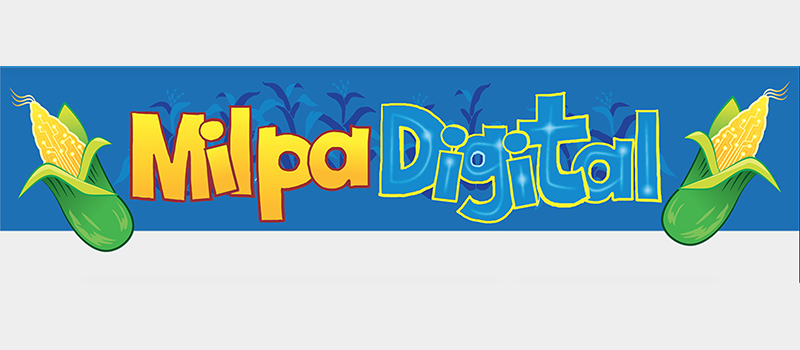
Milpa Digital logo used under a CC BY-SA 4.0 license.
Rising Voices note: Our biweekly newsletter provides a summary of our recent blog posts about all aspects of digital inclusion including access and adoption of digital tools, as well as different ways and opporunities for communities to fully participate online. Read here [1] for previous editions of this newsletter.
A “Milpa [2]” refers to a collective form of practicing agriculture and can be traced back centuries amongst Mesoamerican Peoples. This practice goes beyond simply raising crops, but rather a philosophy that benefits the entire community.
It is in this spirit that a new resource called “Milpa Digital [3]” created by the collective Código Sur that seeks to “plant seeds that can help produce a Mesoamerica that is technologically free and socially nurtured by popular movements.”
Topics covered by the resources include using alternative email services, basic security for mobile phones, and basic encryption practices.
All of their resources can be downloaded [4], adapted, and freely used under a CC BY-SA 4.0 license.
MORE FROM THE RISING VOICES BLOG
For this issue, we’d like you to meet two recent hosts of our rotating Twitter project on African language digital activism (@DigiAfricanLang [5]). We would like to thank Andriamifidisoa Ny Haja Zo [6] for sharing with us his work on the Malagasy language and Mazhun Idris [7] for his work on the Hausa language. Please read the Q&A posts to learn more about them and their work!
Also in this issue, we’d like to introduce you to a recent guest-host of @ActLenguas [8] — indigenous language digital activist from Latin America: Rony Arnoldo Otzoy Chipix [9] [es] (the Kaqchikel Mayan language, spoken in central Guatemala). In his profile post, you’ll get to know more about him and his work in revitalizing/promoting of his native languages.
And if you are curious about how Native American and First Nations language revitalization efforts are being aided by the internet and technology, you should check out what our recent hosts of @NativeLangsTech [10] have to say about their work in digital activism for these languages. We present you the Q&A blog post with a recent host Niigaatikwe (Jordyn Flaada) [11] (for the Ojibwe language spoken in the Great Lakes region of Canada and the United States)
Starting in August, digital activists of Asian indigenous languages have also joined the momentum in celebration of the International Year of Indigenous Languages (#IYIL2019). If you want to learn more about the current status of indigenous languages across Asia, please follow our newest rotating Twitter campaign @AsiaLangsOnline and read the profile posts of our recent hosts Sanjib Chaudhary [12] (Eastern Tharu of Nepal) as well as Mingma Phuti Sherpa and Pasang Yangjee Sherpa [13] (Sherpa from the Himalayas).
In addition to digital activism on indigenous languages, we’d like to highlight an effort made by Tanzanian tech innovators in improving the quality of education in the country. → “Tech innovators in Tanzania connect 5,000 tutors with students in new online platform [14]”
FUNDING
Are you a member, or an organization, of First Nations communities in British Columbia, Canada? The newly launched Digitization Grant Initiative (DiGI), a funding that aims to support the digitization of Indigenous language resources, is now open for applications. If you are looking to better preserve your language materials for future access, please visit this page [15] for further details and guidelines. Application due: September 30, 2019
As shared in the previous issue [16], the Indigenous Connectivity Summit 2019 will take place in Hawaii this November. Because there’s so much to cover yet limited time during the event, the Internet Society has put together a series of two virtual training sessions to better engage the attendees prior to the event. Please see here [17] for details as well as sign-up information.
AWARDS
The Puffin / Type Prize for Creative Citizenship, a joint project between the Puffin Foundation Ltd. and Type Media Center, is an annual award that intends to encourage the recipients to carry on with their current endeavors and to inspire others to challenge the status quo in their own unique ways. Please see here [18] for previous winners as well as instructions for nominations.
TOOLS & RESOURCES
Looking for a tool to help you with audiobook alignment in North American indigenous languages? Here you go [19]. It was nice of David Huggins-Daines [20] to share this [21] on Twitter. Note: This software is provided to you free of charge under MIT License © David Daines, Patrick Littell, Aidan Pine [22]. (License in detail [23])
Missed the 2019 Stockholm Internet Forum [24] in May and would like to catch up? Links to the event recordings: Day 1 [25] and Day 2 [26]. [H/T – APC’s Community Networks newsletter [27]]
ADDITIONAL READINGS, LISTENINGS, and VIEWINGS
- Teacher uses Twitter to revive Munsee language [28] via London Free Press
- In an Indigenous University: A Journey of a Pamusepian [29] via Langscape Magazine (Terralingua)
- Yukon First Nation harnesses power of social media to teach local language [30] via CBC
- My sense of belonging – Datu Amay [31] as presented by Voice Talks via SoundCloud
- Bulos, My language, our Legacy [32] as presented by Voice Talks via SoundCloud
- Facebook is going after fake news in local African languages [33] via Quartz Africa
- How do you document indigenous oral history in an open way while still respecting community ethics? [34] as presented by Subhashish Panigrahi at Wikimania 2019
- Ulukhaktok: Community Networking in the (Far) North [35] via the Internet Society
Subscribe to the Rising Voices Newsletter [36]